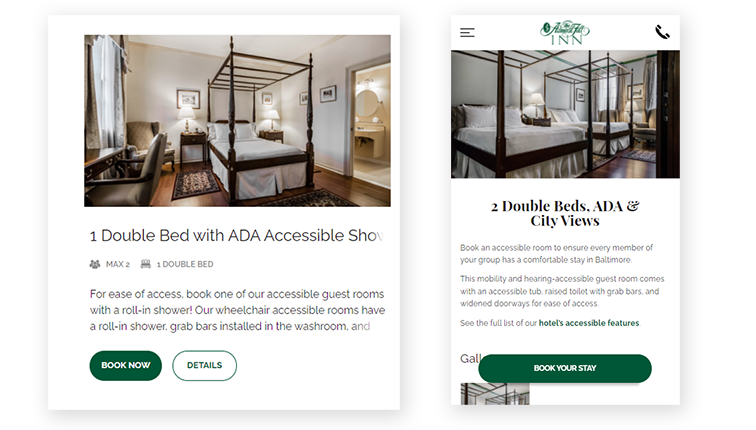What you need to know about ADA for hotel websites in 2024 and beyond
The American Disabilities Act (or ADA) was passed in 1990, long before websites were a twinkle in most hoteliers’ eyes. Most hotels know what they need to do to make their on-site premises accessible, but the digital world is not nearly as straightforward.
The small print is vague because, as written, the Act itself does not include the word websites. However, hotels are included as public facilities. Per the letter of the law, all communications provided by a hotel must therefore ADA compliant, which is where your website comes into play.
To make matters more confusing, there is no agreed-upon standard of ADA compliance for the web in general. The closest thing to accessibility “rules” is the Web Content Accessibility Guidelines (WCAG) created by the World Wide Web Consortium. WCAG 2.2 was finalized in 2023, with WCAG 3 still under development.
Hotel websites can meet WCAG 2.2 in three key ways:
- The content itself
- The technical design
- Accessible integrations
Updating your hotel website for ADA compliance is of particular importance for US-based hotels. The current legal grey area has increased the number of attempted lawsuits against hotels not meeting WCAG standards. Per the US Justice Department in 2010, hotels are required to identify and describe their accessible features with enough detail that someone who might require them would be able to assess if they can book that hotel.
In the last decade, the specifics and legalities around this have remained a grey area. At the end of 2023, the US Supreme Court dismissed a related court case of the filer of 600+ lawsuits. The specific standings vary district by district. Regardless, it is in every hotels best interest to seriously considering the accessibility of their website. Not only to avoid potential costly lawsuits, but also to ensure that they are a welcoming environment for every guest.
Leonardo builds hotel websites that meet current best practices, from the content to the code itself. We have also partnered with Userway to improve compliance on our hotel partner’s sites.
ADA compliant content for hotels
One of the easiest starting points for meeting ADA requirements on your hotel website is in the actual on-page content itself. One in four adults in the USA have some type of disability. Providing relevant information about your accommodations is a smart business move to capture this market while also meeting ADA web requirements for hotels.
Information about accessible features at your hotel needs to be clearly and prominently featured wherever relevant. Provide relevant information about your amenities, such as pool access or elevator details. And crucially, your hotel website’s Rooms page and sub-pages should make it clear exactly which accessible room types and features your hotel offers.

You may also want to consider creating a dedicated Accessibility page, which you can include in your footer and link wherever relevant on your website (see above image, right).
Your Accessibility page should gather all relevant information about your hotel. List in-room accessible features, as well as the arrival experience and accommodations for mobility around your parking, dining, and any other relevant amenities. It can also include a disclaimer around your good-faith compliance with WCAG guidelines, as well as an invitation for relevant feedback.
Technical ADA compliance for hotels
Beyond the writing itself, the technical design of your website needs to have been built with WCAG compliance in mind. Some of the elements of accessible web design include:
- Navigable by a screen reader as well as by keyboard
- Titles for all pages, images, and PDFs (for screen readers)
- Alt text for images
- Appropriate contrast between text and background
- Easily identifiable interactive elements (e.g., links in a secondary color)
- Good use of spacing for easy scanning
Given that hotels may be legally responsible for the compliance of their website, we highly recommend you use a dedicated hotel website builder that has built website designs for hotels ADA compliance. A DIY or drag-and-drop site builder could leave your hotel open to potential litigation.
Accessible integrations
Best practices shift over time. That’s why some hotel website providers, including Leonardo, rely on partners to keep their websites up to date for hotels. A third-party integration increases the accessibility and usability of your website without additional work.
Leonardo has partnered with Userway, which adds a small widget to each site. Clicking on the widget allows a user to change the website’s design for improved accessibility. Userway helps ensure that hotel websites built by Leonardo are compliant with WCAG 2.2 from the moment they launch, without impacting site speed or performance.
As the #1 accessibility solution trusted by brands like Disney and eBay, working with Userway means that Leonardo’s hotels have increased protection and a competitive edge against hotels that may not be accommodating this essential market.
Launch an accessible, revenue-driven website
Leonardo builds strategic websites that are built with accessibility in mind, from the code to the content. We take care of writing and building your website, backed by a custom SEO strategy that is proactively monitored and updated as needed. Learn more about our website building solutions. Or contact us for a short demo of how we can improve your web presence.
